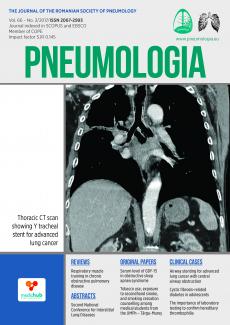Pleural effusions - Experience of Pneumophtisiology Hospital Tudor Vladimirescu - I: Clinical study
Marian Olaru1, Iancu Emil Pleşea2, Dan Mălăescu3, Rodica Olaru4
1 Spitalul de Pneumoftiziologie "Tudor Vladimirescu", judeţul Gorj2 Disciplina de Morfopatologie, UMF Craiova3 Penitenciarul Tg-Jiu4 Cabinet medicalContact: pie1956@yahoo.com
Pleural effusions still represent major problem of respiratory tract pathology because of the invalidity potential of pleural involvement and because of the increasing incidence of diseases frequently accompanied by pleural effusion such as tuberculosis and malignant pleural proliferations. The retrospective study concerned 221 cases with pleural effusions divided into three groups depending on the etiology (bacillary, neoplastic and others). Two categories of features were assessed: parameters assessed in the first 48 hours (epidemiological data, history data, clinical data, IDR and sedimentation rate) and parameters assessed after thoracentesis and/or pleural biopsy (LDH in pleural fluid and BK presence in pleural fluid and biopsy specimens). Bacillary etiology was dominating the studied group but possibly because the hospital was well known as a mainly antituberculous medical unit. The main profile of the investigated patiens was: man, teenaged or adult, smoker and often alcoholic living in town. Clinical appearance was influenced by the triad: etiologic agent - age - pleural fluid amount. Reduced amount of pleural fluid was related to acute onset, usually in young men and simptomatology dominated by thoracic pain. In contrast, massive pleural effusion was related with chronic
onset, dyspnea and adult or old age. LDH and glycopleuria values are not pathognomonic but useful for diagnostic orienting but if microscopic or culture evidence of BK in pleural fluid or tissue specimens are added the diagnostic accuracy is increasing.
In conclusion, a thorough clinical examination completed with a complex panel of laboratory investigations, including biochemical microbiological and special tests from pleural fluid and also a cytological examination could guide the diagnostic in establishing the type and the cause of pleural effusion.




